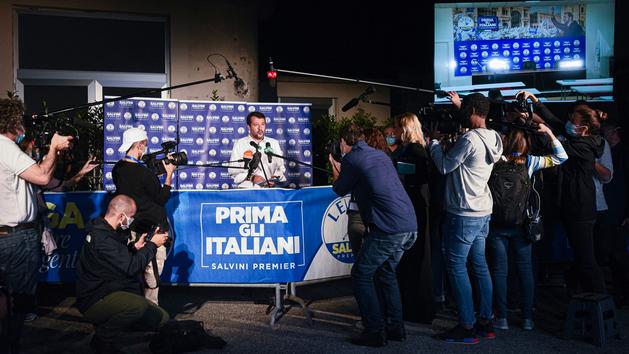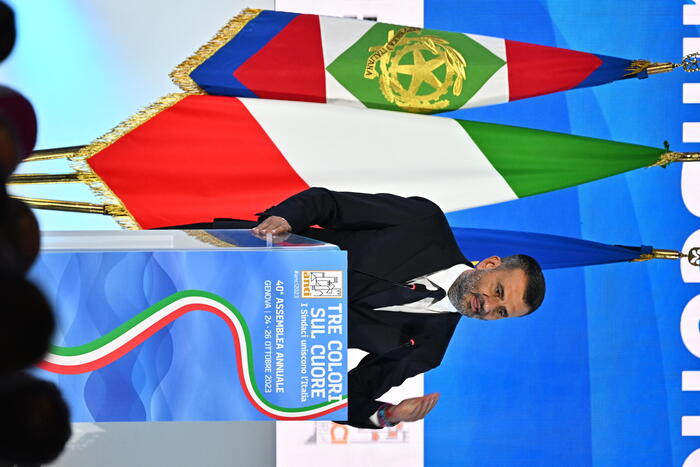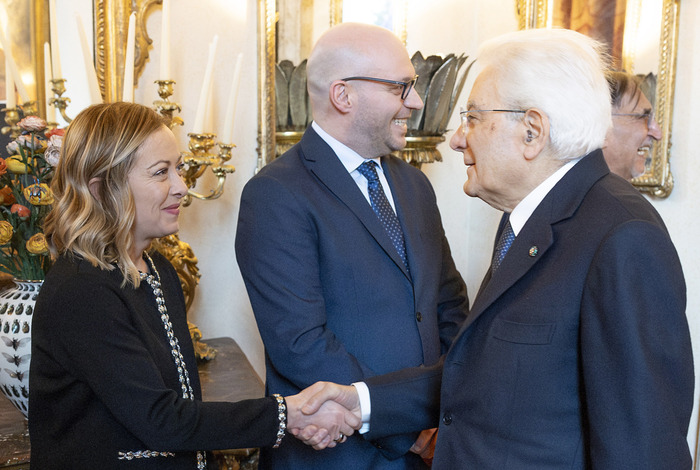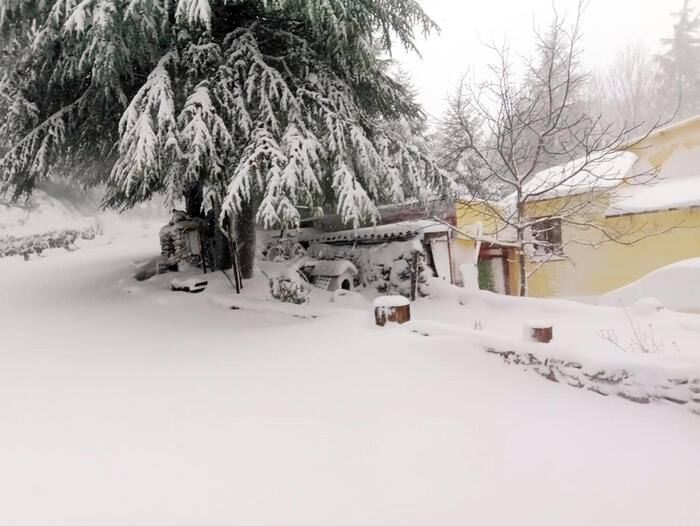Marie d'Armagnac is a freelance journalist. She is the author of
Matteo Salvini, the undisciplined
(Editions du Toucan-L'Artilleur, 2019).
On September 20 and 21, Italian regional elections were held in Italy for the renewal of the executive in seven regions: Tuscany, Marche, Puglia, Liguria, Campania, Veneto and Valle d'Aosta.
First electoral consultation since the coronavirus epidemic - these elections scheduled for March had been postponed, unlike the French municipal elections - these elections were accompanied by a referendum on a bill to reduce the number of parliamentarians (from 945 to 600 , Senate and National Assembly combined).
This bill, supported by the populist party of the Five Star Movement (M5S) currently in government, had already been adopted by all political forces during a vote in parliament: in the opposition, the Fratelli d'Italia party of Giorgia Meloni saw it as a step in the direction of a more presidential regime that he calls for and Matteo Salvini's League also saw it as an opportunity not to lose contact with his former allies of the M5S.
Consistently, they voted in favor of the bill, although several voices were raised within both parties in favor of a negative vote.
On the left, Nicola Zingaretti's Democratic Party (PD), after having fought this project for a long time, called for votes in its favor, supporting its ally M5S with whom he has governed for a year.
This referendum should logically be followed by a reform of the electoral law, of which the parties in power, PD and M5S, would like it to be able to introduce a greater dose of proportionality.
This referendum should logically be followed by a reform of the electoral law, of which the parties in power, PD and M5S, would like it to be able to introduce a greater dose of proportionality, an election which would favor their parties at the expense of the right-wing coalition. carried by the parties Fratelli d'Italia, Ligue and Forza Italia, the party of Berlusconi.
Italy again seems to succumb to its habitual habit of frequently changing electoral laws, depending on the ruling coalition, which does not augur well for the stability of future governments.
Not surprisingly, therefore, the yes won by an overwhelming majority, over 69%: it should be noted, however, that a few months ago, the polls predicted a much more striking victory.
With this expected unanimity, 30% of voters therefore said no.
Who will be able to listen to them?
Surely not Luigi Di Maio, the leader of the M5S and current Minister of Foreign Affairs, who was quick to claim victory, claiming it as being that of his only party, and thus reviving what made the original success. of his party, namely the struggle "against the political caste".
Without a doubt, he thus hopes, internally, to restore his image and regain his leadership, fiercely discussed in recent weeks, and above all to make people forget his stinging electoral setback in the European elections, and his disastrous results in the regional elections which were held at the same time. .
Giuseppe Conte, who is a pure product of M5S, hastened to say that these elections and especially the results of the referendum confirmed his presence at the head of government until 2023, date of the next legislative elections.
This is to forget the insistent presence of Nicola Zingaretti, boss of the PD, who intends to "battere cassa" as they say in Italy, to go to the cash register and monetize his support for this referendum stamped "5 stars" by a rebalancing in his favor within the government, and this while his party is in the minority in parliament.
Under pressure from his left wing, he wanted to quickly demand the repeal of the Security and Immigration law known as the Salvini law, passed in the spring of 2019 by the M5S when it governed with the League, and strongly, at the time, seconded by Giuseppe Conte, who was already President of the Council.
For his part, Giuseppe Conte, who is a pure product of the M5S, hastened to say that these elections and especially the results of the referendum confirmed his presence at the head of government until 2023, the date of the next legislative elections, and this, while he was remarkably discreet during the electoral campaign.
But despite what many observers say, namely that these elections, far from shaking the government, ensured a certain stability, it is not certain that Nicola Zingaretti sees it all in the same way: whispers behind the scenes of power that he would see himself take the place of Giuseppe Conte, or at least bend government policy to the left, and gain the upper hand over his ally M5S.
For this, he will be able to argue about his results in the regional elections, less bad than expected: in fact the Democratic Party of Zingaretti has managed to keep the very red Tuscany where the center-right coalition was presented under the colors of Susanna Ceccardi, a close relative. by Matteo Salvini.
As in Emilia-Romagna last autumn, the center-right failed to bring down this stronghold of the left, as the good results in the European elections had led to hope.
Eugenio Giani, candidate of the left and close to Matteo Renzi obtained 48.6% of the vote, against 40.45% for the center-right.
As in Emilia-Romagna, clear progression of the right-wing coalition, but not enough to win the election.
In Puglia, the same scenario: the center-right candidate Raffaele Fitto, who had led the region between 2000 and 2005, failed to switch the region to the right again, Michele Emiliano therefore won with 46.7% of the vote.
In Campania, another region of the South, Vincenzo De Luca keeps the region on the left with a landslide victory of 69.48%.
The right-wing coalition is failing in these two southern regions where it hoped for a breakthrough, undoubtedly for the lack of local executives, but perhaps also because it was unable to bring out new personalities: Raffaele Fitto and Stefano Caldoro had already respectively in charge of the Apulia and Campania regions, it is likely that the voters felt a clear sense of déjà vu… and preferred to vote for the outgoing.
The real question would rather be whether the failure in the South and the resounding success in the North will not bring the League back to a more regional than national dimension.
In the Marches, the center-right coalition brings down the left junta, in another of the historically red regions.
A great victory for the candidate Francesco Acquaroli, member of the party Fratelli d'Italia led by Giorgia Meloni, who led the coalition.
In Liguria, the regional president Giovanni Toti (center-right) is comfortably re-elected, and in Veneto, Luca Zaia smashes all the records of the Italian regional elections: this historic member of the League for decades wins 76, 79% of the vote.
The Serenissima, or the Superdoge as it is called there, confirms, as in other regions of the North, the capacity of "good government" of the League.
Very different from Matteo Salvini, will the "Superdoge" overshadow the "Capitano" in the ranks of the League, to the point of challenging its
leadership
?
If there is, as always in the aftermath of elections, murmurs and discontent, we must not forget that since its foundation by Umberto Bossi, the figure of the leader is very important for Leghist militants.
The real question would rather be whether the failure in the South and the resounding success in the North will not bring the League back to a more regional than national dimension.
Are these regional elections a defeat for the Italian right, and a new spring for the left, as many observers, French and Italian claim?
In reality, out of six regions in play (the seventh, the Valle d'Aosta has a particular structure; it will nevertheless be governed on the right, with the League as the first party) the left loses one in four: it will therefore govern five regions, and the right fifteen of the twenty in Italy.
In 2015, the center-right ruled only three regions, the left all the others.
Admittedly, the progression of the right is less rapid than announced, but Italy, where the weight of the regions and regional identity is very strong, far from the French Jacobin centralism, finds itself with a majority of regions governed by right-wing coalitions, and a central government of which, as we have seen, we can foresee a clear shift to the left.
Giorgia Meloni has a good game to declare to Corriere della Sera:
"The left played on the fear of losing Tuscany, as it had done with Emilia-Romagna, to pass off as a victory the fact of being returned. in regions which are historic strongholds for it. "
In reality, the League, despite a notable decline since the fall of the Ligue-M5S government caused by Matteo Salvini himself, remains the leading party in Italy, and governs the northern regions, the economic heart of the peninsula.
To what extent will the absolute leadership exercised by Matteo Salvini over the Italian center-right be called into question by the Tuscan setback?
It is true that Giorgia Meloni, a tenacious and hardworking politician, and her Fratelli d'Italia party, founded on the rubble of the National Alliance, doubled or even tripled the number of votes compared to the European elections of 2019. It is also true that 'she is rather spared by the media, who readily describe her as a more presentable version of the Italian right, in contrast to Matteo Salvini, bête noire of big titles like Repubblica, Il Fatto daily, (very close to M5S) or the 'Espresso, making him take on the very Giraldian role of scapegoat, a role formerly devolved, despite himself, to Silvio Berlusconi in the 90s and 2000s.
For months now, the press has been staging the Meloni-Salvini duel, excusing here a little sentence, there a movement of humor, to shatter a coalition which, it must be remembered, progresses with each electoral consultation.
Media artificiality or a real quarrel of egos?
In reality, the League, despite a notable decline since the fall of the Ligue-M5S government caused by Matteo Salvini himself, remains the leading party in Italy, and governs the northern regions, the economic heart of the peninsula.
But the Italian electoral system obliges and allows alliances and coalitions, Salvini and Meloni need each other, and it's a safe bet that neither Meloni nor Salvini would want to take responsibility for a break between them.















